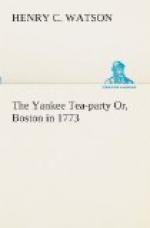[Illustration: GENERAL MORGAN.]
“We seldom hear of a man admitting that he was ever afraid,” observed Hand. “But the man who never knew fear must be possessed of a small degree of intelligence and no sense of responsibility; neither of which are creditable. Great generals, and soldiers, in all ages, have boasted of their freedom from dread under all circumstances. But it is a mere boast. Fear is natural and useful, and I have ever observed that the man of most fear is the man of most prudence and forecast.”
“Do you mean to say that the coward is the wisest man?” enquired Kinnison, in astonishment.
“Oh, no. A coward is one who will not grapple with danger when he meets it, but shrinks and flies. A man who is conscious of dangers to be met, and feels a distrust of his own power to meet them, is a different sort of person,” replied Hand.
“Well, that’s a very nice distinction,” remarked one of the young men.
“There’s truth in what he says, however,” said Ranson. “I have felt a fear of consequences many a time, yet I know that I am not a coward; for my conduct in the time of battle, and when death was hailing around me, proves it.”
“I can’t see any distinction between a coward and a man of many fears,” remarked Davenport; “though, of course, I don’t know enough of words to argue the point.”
“To make it clearer,” replied Hand, “I will assert that Washington was a man fearful of consequences, and some of those who refused to go to the aid of the heroes of Bunker Hill were cowards.”
“It’s all plain enough to me,” observed Colson. But the rest of the company, by shakes of the head and meditative looks, indicated that the distinction was not perceptible to their mental vision.




